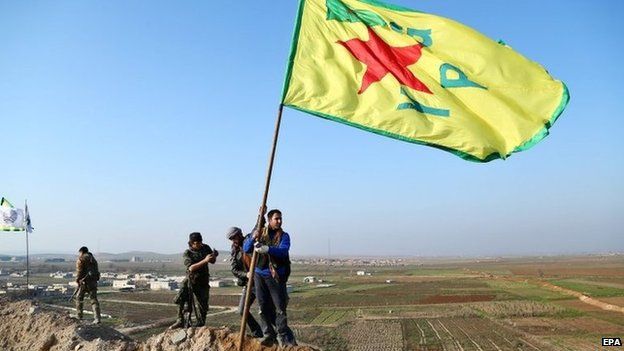Syrian Kurds 'drive Islamic State out of Kobane'
- Published

Kurdish forces have driven Islamic State (IS) militants from Kobane, officials say, ending a four-month battle for the northern Syrian town.
Fighters from the Popular Protection Units (YPG) were said to have entered outlying areas in the east of the town after the jihadists retreated.
The US said anti-IS forces were in control of 90% of the town.
Kobane was seen as a major test of the US-led coalition's strategy to combat IS in Syria with air strikes.
Tens of thousands of people fled over the nearby border with Turkey after IS launched an offensive in September, capturing about 300 nearby villages before entering the predominantly Kurdish town itself.
The fighting has left at least 1,600 people dead, among them 1,196 jihadists, the UK-based Syrian Observatory for Human Rights says.
'Final clean-up'
Photographs posted on social media on Monday afternoon showed the YPG flag being flown around Kobane, and male and female fighters shaking hands. As night fell, celebratory gunfire echoed across the town.
Analysis: Paul Wood, BBC News
The Kurds in Kobane are jubilant. After 131 days of fighting, they say they have triumphed over the so-called Islamic State.
If this is indeed the victory the Kurds claim, it would not have happened without American bombing.
This setback for IS does not necessarily mean they are losing overall.
Syrian opposition sources say IS actually have more territory under their control now than when the United States and its allies started bombing, last August.
In Iraq, the authorities say Islamic State have been pushed out of the eastern province of Diyala - but the jihadis have made gains to control most of the western province of Anbar.
The battle against IS is ultimately a battle for Sunni Muslim public opinion - and Sunnis have been angered by the civilians casualties in their areas caused by US airstrikes.
YPG spokesman Polat Jan meanwhile declared on Twitter: "Congratulations to humanity, Kurdistan, and the people of Kobane on the liberation of Kobane."
Anwar Muslim, the president of the self-declared Syrian Kurdish canton of Kobane, told the BBC that the town was fully under the control of the YPG and Iraqi Kurdish Peshmerga fighters who were deployed in October.
However, he added that the situation in the eastern outskirts was still "a little tense", with YPG fighters carrying out "the final clean-up" and besieging areas they believed IS leaders might be hiding.
A statement from US Central Command congratulated the Kurdish fighters, AFP reported.
"While the fight against ISIL (IS) is far from over, ISIL's failure in Kobane has denied them one of their strategic objectives," it said.
The advance by Kurdish forces came after several days of heavy aerial bombardment by coalition aircraft.
The Pentagon said it had carried out 17 air strikes in the 24 hours from the morning of 25 January, targeting IS "tactical units" and "fighting positions", as well as vehicle and staging areas.
The retired US general co-ordinating the coalition, John Allen, predicted in November that IS would "impale itself" on Kobane, and analysts said its loss would be a symbolic and strategic blow for the group, which wants to control an uninterrupted stretch of the Syrian-Turkish border.